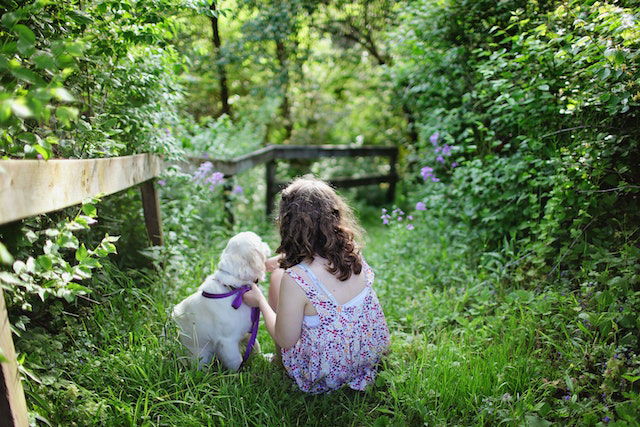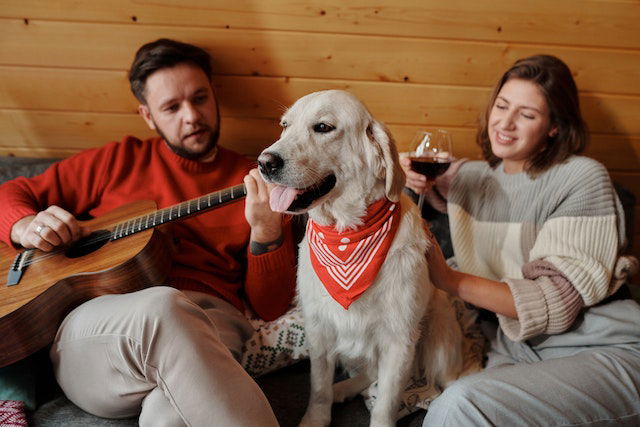We're an affiliate
We hope you love the products we recommend! Just so you know, we may collect a share of sales or other compensation from the links on this page at no additional cost to you. Thank you if you use our links, we really appreciate it!
You’re probably wondering why every Golden Retriever owner is admiring this breed. If you own one, you already know how charming they are.
But why are Golden Retrievers so nice? These beloved fluffy dogs have found a sweet spot in many families across the world because of their friendly nature and patience with kids.
Read this article to discover why Goldens are wonderful, how to make them more friendly, and explore our answers to some of the most frequently asked questions on this topic.
Golden Retriever Breed History and Origin
Golden Retrievers are known today as calm and friendly family dogs who may seem harmless, but what may surprise you is that they were originally used as hunting dogs.
It all started with Sir Dudley Marjoribanks, who later became the first Lord Tweedmouth.
He was looking for a favorable breed that would help hunters and sportsmen in retrieving waterfowl from the marshlands in Scotland.
The nobleman purchased a yellow retriever ‘Nous’ from a cobbler in Brighton in 1868, and mated him with a Tweed Water Spaniel (now extinct breed) known as ‘Belle’.
The first breeding gave rise to a litter of four puppies, who were later crossed with other desired breeds, including Labs, Bloodhounds, and Irish Setters, to develop what we know as ‘Golden Retrievers’ today.

Historically, Goldens were used as gundogs and water retrievers to assist hunters in picking gunned waterfowl, hunting partridge, and sometimes the red deer.
The then hunters and sportsmen across the UK discovered how diligent were the Golden Retrievers in their fieldwork and how loyal they were to their masters.
These dogs would chase game both on land and in the water while covering long distances to impress their masters with a catch.
Golden Retrievers inherited some impressive characteristics, including being friendly and gentle to humans, from their ancestors.
They also took on the strength and agility of their Water Spaniel fathers, who were robust and resilient in their fieldwork.
Desirable Characteristics Required During Breeding
Lord Tweedmouth had a set of desired characteristics that he needed in a good hunting companion.
He wanted a dog with a soft mouth that would pick up the gunned-down birds without harming them with their sharp canines.
The breed also needed to have good stamina and endurance to accompany the hunters across the vast fields without getting tired easily.
Additionally, the upcoming breed needed to have impressive running abilities to catch up with the hunted birds and upland game.
More importantly, the dog had to be an excellent swimmer, with a fluffy coat to keep moisture away from the skin.
Genetics and Temperament
The friendly and gentle nature of Golden Retrievers can largely be attributed to everyday socialization and training, but Genetics plays a role.
A study on the genetic characterization of dog personality traits confirmed that a dog’s bloodline can influence their behavior and temperament.
Golden Retrievers come from a family tree cluttered with friendly breeds, including Labs and their great grandfather; the Newfoundlands.
These double-coated canines have an affinity for making friends with humans and are also eager to please us.
These inherent traits make it very easy to train a Golden Retriever on commands and behavior, making them a first choice among many prospective pet parents.
Goldens also have inborn traits that make them slow to anger and with low levels of fear.
When breeders select dogs to breed for a friendly temperament, they focus on parents who are healthy, gentle, sociable, and eager to please.
These gundogs have been found to score higher in social skills, playfulness, friendliness, and laid-back personalities.
Golden Retrievers are widely regarded as one of the friendliest dog breeds in the world, comparable to the Beagle, Boston Terrier, Cavalier King Charles Spaniel, and Labrador Retriever.
Socialization and Training
Having a favorable genetic makeup alone is insufficient to make your Golden Retriever friendly and gentle with humans.
To shape the social life and behavior of your fluffy Golden pal, you need to consider early socialization and consistent training

We recommend starting socializing your Golden puppy at an average tender age of 9 weeks, as they are open to new experiences and learning during this period.
Early social learning will open their minds to the world and help them to settle in quickly.
It also introduces them to their human caregivers and teaches them how to interact with other pets and their boundaries at home.
Training Methods
Golden Retrievers are highly intelligent dogs, which means they can easily take up command training with a few repetitions.
These dogs are motivated by high-value foods, such as cut-up sardines or shredded boiled chicken, making them respond well when using positive reinforcement methods during training.
Therefore, you should reward your Goldie when they show progress during training and redirect their behavior positively when they seem not to catch up.
Never use punishment-based methods to train your Golden pal, as scolding and punishing the dog for doing what you never expected will do more harm than good, and ultimately stain your bond with the canine.
The training environment for your Golden Retriever should always be quiet and away from distractions. You can set up a place in your yard or indoors, depending on what you want to teach your dog.
Since Golden Retrievers are fun-loving, you should always strive to make the training sessions fun and entertaining for your Golden pal.
As you work on molding friendly behavior in your dog, remember that you also have a role to play as the owner.
According to this study, dog owners have a significant role to play in shaping their dog’s personalities, including providing quality meals, setting aside some time to interact with their dogs, petting them, and providing general hygiene care to keep them healthy.
A well-fed, socialized, physically active, and mentally stimulated Golden Retriever is less likely to develop unwanted behaviors.
Environment and Upbringing
How you raise your Golden Retriever and their immediate environment play a role in determining their temperament.
Golden Retrievers can thrive both in urban and rural settings, but their environment needs to be calm for their upbringing.
Additionally, an area with lots of people and pets will expose your Goldie to a socially active environment, making them more sociable.

An urban environment with lots of traffic noise and chaos will make your Golden Retriever stressed and anxious, especially if they never go out.
Make sure to take your dog out and expose them to their immediate environment. They should be familiar with nearly all the streets in your neighborhood to help them settle in.
The impact of neglect and abuse on temperament
Neglecting your Golden Retriever will certainly predispose them to stress and anxiety.
Likewise, dogs who have had previous encounters with physical and emotional abuse are always aggressive and ready to fight back.
A painful past makes the dog lose trust in humans or other dogs, and they may choose to live a solitary life with no social skills.
Neglecting your Golden Retriever for a long time may also cause them to develop unwanted behavior such as chewing on items and excessive barking to attract your attention.
The importance of a loving and caring upbringing
Living with your furry friend in a delightful and affectionate manner will shape them into developing sociability and gentle interactions with humans.
This involves creating time to play with your dog, providing them with all the basic needs, and taking them for regular checkups at the vet.
A loving spirit will inspire the dog to create unbreakable social and emotional bonds with the family, forming a perfect relationship.
Golden Retrievers as Therapy or Service dogs
Goldens Retrievers as Therapy Dogs
Golden Retrievers are well-suited to serve as therapy dogs due to their friendly temperament, gentle demeanor, and patient nature.
They make great companions for people in need of emotional support in hospitals, nursing homes, schools, and other settings.
Their soft, fluffy coat also makes them perfect for cuddling and petting.
In addition, Golden Retrievers have an inherent nature to please their owners, which makes them good therapy dogs in hospitals.
Goldens also have the ability to read human emotions, enabling them to understand when we are happy or sad. This empathetic nature makes them ideal for reading people’s emotions in hospitals and providing comfort with care.
Golden Retrievers as Service Dogs
Golden Retrievers are work-driven and can be trained as service dogs to assist people with certain needs, such as those with impaired vision, hearing challenges, or mobility issues.
These highly intelligent dogs are among the first choices for service dogs due to their trainability, desire to work, and friendly nature.
Golden Retrievers are suited to work as service dogs because they can form strong emotional ties with their patients.
The Importance of Temperament in Service Work
A good service dog must always remain calm and laid-back during their daily interactions with humans.
Golden Retrievers are well-suited for this function and are also highly adaptable to different environments.
Frequently Asked Questions (FAQs)
1. What makes Golden Retrievers so friendly?
Golden Retrievers are friendly to their human family due to their favorable genetic makeup, socialization, and training.
This breed was selectively bred to incorporate the desired qualities needed for accompanying hunters in the field.
Goldens are also eager to please, meaning that they will go the extra mile to make their handlers happy.
2. Are all Golden Retrievers friendly?
Although the friendly nature of Golden Retrievers is written in their DNA, some of them might be reserved due to poor socialization or lack of training.
Some Golden Retrievers can be trained to be decent guard dogs, making them cautious in their interactions with strangers.
3. Can Golden Retrievers be aggressive?
Golden Retrievers are NOT naturally aggressive dog breeds, although they may become angry when wronged.
Aggression in Golden Retrievers may also occur when the dog is not properly socialized from puppyhood or suffers from separation anxiety.
4. Are Golden Retrievers the friendliest dogs?
Golden Retrievers have often been categorized as the friendliest dog breed, while some people rank them a close second or third.
It’s undisputed that they are among the top 5 friendliest dog breeds in the world, alongside Beagles, Border Collies, Poodles, and their distant cousins, Labrador Retrievers.
Conclusion
Goldens are always nice to humans and other pets due to their inherent traits and gentle temperament.
The innate characteristics of Goldens can be attributed to their ancestral breeds, which were carefully selected to give rise to the perfect gundog for hunters.
Despite their natural inclination to friendliness, it is crucial to socialize and train your Goldie right from puppyhood to shape good behavior.
We will continue to monitor future research on this topic and update our views on the factors that affect the temperament of Goldens.
Laura is the founder of Furs'n'Paws. She is a also a pet writer and expert with more than 20 years of experience of working with dogs and cats. She developed a very strong love for animals at a young age. Her passion led her to establish a thriving pet sitting and dog walking business in Dubai. As an expert in pet training, behavior, and nutrition, Laura is committed to helping pet owners and pet lovers by offering high-quality information on a wide range of topics.



No responses yet